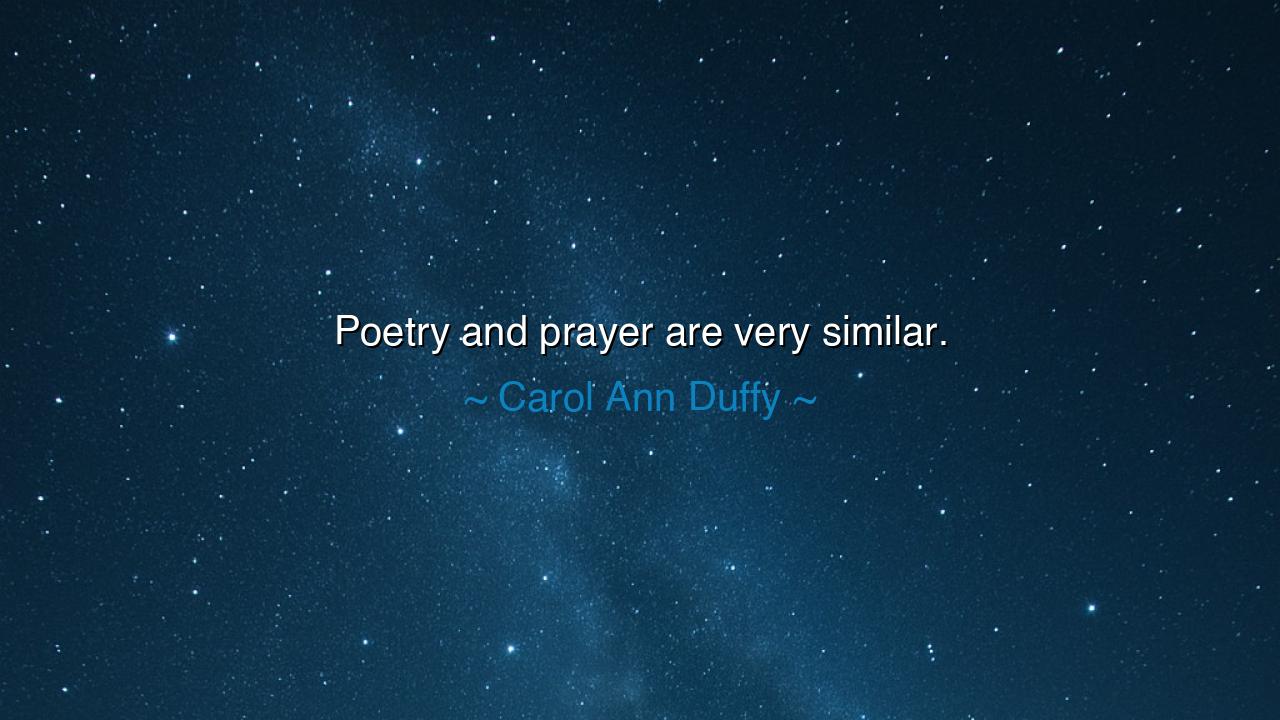
Poetry and prayer are very similar.






Carol Ann Duffy, in her quiet yet profound way, once observed: “Poetry and prayer are very similar.” These few words carry the weight of centuries, for they remind us that both the poet and the supplicant reach toward the same horizon. Both speak with words that rise beyond mere information; both shape language to touch what cannot be measured. Whether in verse or in devotion, the human heart cries out for meaning, for connection, for something greater than itself.
Poetry, at its highest, is not the decoration of speech but the unveiling of the soul. It turns silence into rhythm, grief into song, longing into beauty. So too with prayer: it is not only the recitation of holy lines but the opening of the spirit to the unseen. Both are born from depth. Both require sincerity. Both seek to pierce the veil between the ordinary and the eternal. Thus Duffy’s words are not mere metaphor—they are truth revealed through insight.
Consider the Psalms of David, ancient hymns that have been sung for thousands of years. They are at once poetry and prayer—verses of lament, of exaltation, of longing. When David wrote, “The Lord is my shepherd; I shall not want,” he was not writing journalism, nor philosophy, but something that flowed from the same fountain as poetry. His words reached upward and inward at once. They gave voice to grief and joy, but also lifted the heart toward the divine. Such writings prove Duffy’s wisdom: the sacred and the poetic drink from the same stream.
History gives us more. During World War I, soldiers wrote poems from the trenches. Some were laments for lost comrades, others desperate cries into the void. Though not formal prayers, these verses carried the same energy: the longing to be heard by something greater, to make sense of suffering, to offer grief in words that outlived the battlefield. In such lines, the difference between poetry and prayer dissolves, for both are attempts to sanctify human experience with meaning.
The essence of Duffy’s quote lies in this: both poetry and prayer demand honesty. A false prayer, spoken without heart, is no prayer at all; likewise, a poem without truth is but ornament. Both are stripped bare of pretense. Both require silence before speech, attention before utterance. Both remind us that words can be more than tools—they can be offerings, vessels, bridges.
The lesson, then, is to approach life with reverence. Let your words, whether whispered in solitude or written on a page, carry the weight of sincerity. When you write, do not write to impress but to reveal. When you pray, do not pray to be seen but to be known. Recognize that the act of shaping language, when done with authenticity, can be both art and devotion.
Practical action follows naturally: begin small. Read a poem aloud, and feel it as if it were a prayer. Then, take a prayer, sacred or personal, and read it as though it were a poem. Notice how both shape the breath, how both rise and fall like tides, how both make silence meaningful. In doing so, you will train your spirit to honor the sacredness of language.
Thus, hear Carol Ann Duffy’s wisdom: poetry and prayer are kin. One rises from the heart to touch beauty; the other rises from the heart to touch the divine. Yet both are acts of the soul, reaching out, trembling, hoping, yearning. To live with this awareness is to walk not only in words but in wonder.






DDongNhizzz
Carol Ann Duffy’s observation that poetry and prayer are similar is thought-provoking. Both require a deep level of reflection and can provide solace. However, does this comparison also imply that both can be used to seek answers to life's questions, or is the goal of poetry more about exploration than resolution? How do we understand the role of poetry in addressing our inner spiritual needs, if it’s not necessarily religious?
PHNguyen Phuong Ha
I love the idea that poetry and prayer are similar, as they both create spaces for introspection and connection to something bigger. But it also makes me wonder: can poetry have the same power to comfort or heal as prayer does for some people? Does poetry need to be spiritual to have the same transformative effect, or can it achieve that in purely emotional or intellectual terms?
::))))
This quote made me reflect on how both poetry and prayer often evoke emotions and thoughts that go beyond the literal. In both, we reach for something intangible, expressing our deepest hopes, fears, and desires. But are all poems spiritual in nature, or is it the way they are received that makes them feel like prayer? How does one distinguish between a poem that is deeply personal and one that is purely artistic?
DNBao Chi Dang Ngoc
Carol Ann Duffy’s comparison of poetry and prayer is intriguing because both seem to be forms of communication that transcend the everyday. Both can be deeply personal and spiritual, yet also carry the power to connect us to something greater. But is this similarity universal, or does it depend on the intention behind the poem or the prayer? How can we balance the poetic with the spiritual in both forms of expression?